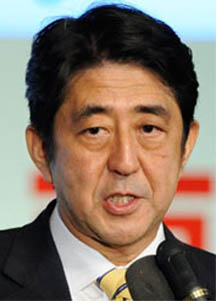TOKYO, (Reuters) – Japan’s conservative Liberal Democratic Party (LDP) surged back to power in an election yesterday just three years after a devastating defeat, giving ex-Prime Minister Shinzo Abe a chance to push his hawkish security agenda and radical economic recipe.
An LDP win will usher in a government committed to a tough stance in a territorial row with China, a pro-nuclear energy policy despite last year’s Fukushima disaster and a potentially risky prescription for hyper-easy monetary policy and big fiscal spending to beat deflation and tame a strong yen.

A TV Asahi projection based on counted votes gave the LDP at least 291 seats in parliament’s 480-member lower house, and together with its small ally, the New Komeito party, a two-thirds majority needed to override, on most matters, the upper house, where no party has majority.
That would help break a policy deadlock that has plagued the world’s third biggest economy since 2007.
“We have promised to pull Japan out of deflation and correct a strong yen,” Abe said on live television. “We need to do this. The same goes for national security and diplomacy.”
Parliament is expected to vote Abe in as prime minister on Dec. 26.
Analysts said that while markets had already pushed the yen lower and share prices higher in anticipation of an LDP victory, stocks could rise and the yen weaken further in response to “super majority.”
While LDP and New Komeito officials confirmed they would form a coalition, LDP Secretary-General Shigeru Ishiba did not rule out cooperation with the Japan Restoration Party, a new right-leaning party that was set to pick up at least 52 seats.
“I think there is room to do this in the area of national defence,” he said. The New Komeito is more moderate than the LDP on security issues.
Projections showed Prime Minister Yoshihiko Noda’s Democratic Party of Japan winning at least 56 seats, less than a fifth of its tally in 2009. Noda said he was stepping down as party leader after the defeat, in which several party heavyweights lost their seats.
The Democrats swept to power in 2009 promising to pay more heed to consumers and break up the “iron triangle” of the powerful bureaucracy, business and politicians formed during more than half a century of almost unbroken LDP rule.
Many voters had said the DPJ failed to meet election pledges as it struggled to govern and cope with last year’s huge earthquake, tsunami and nuclear disaster, and pushed through an unpopular sales tax increase with LDP help.
Voter distaste for both major parties has spawned a clutch of new parties including the Japan Restoration Party, founded by popular Osaka Mayor Toru Hashimoto.



